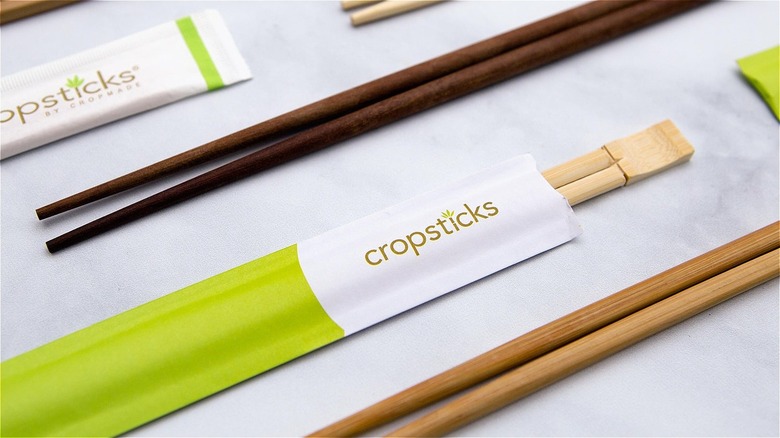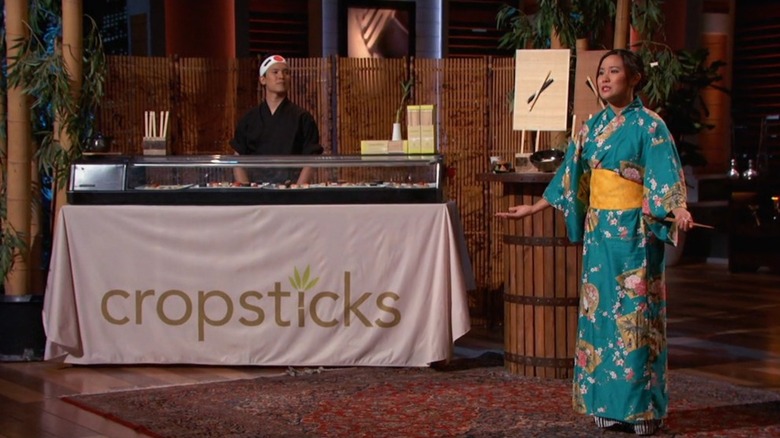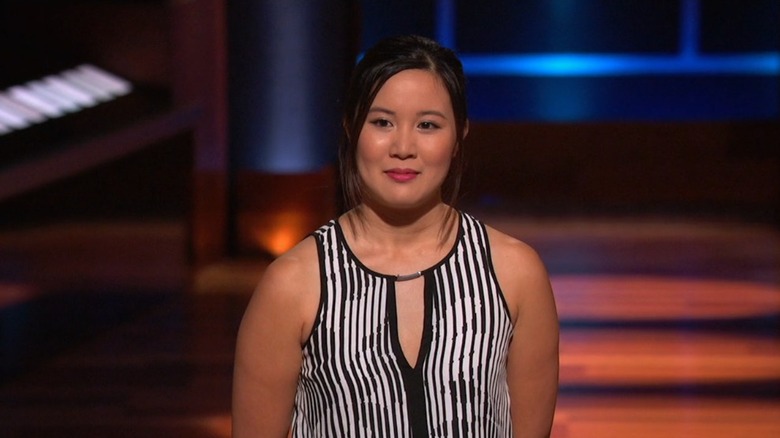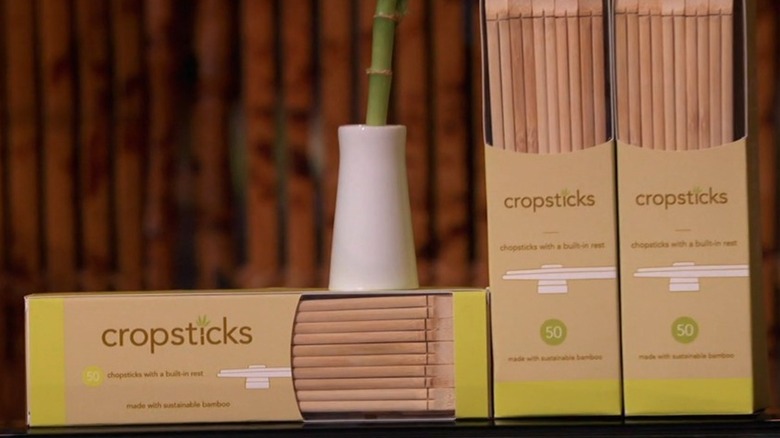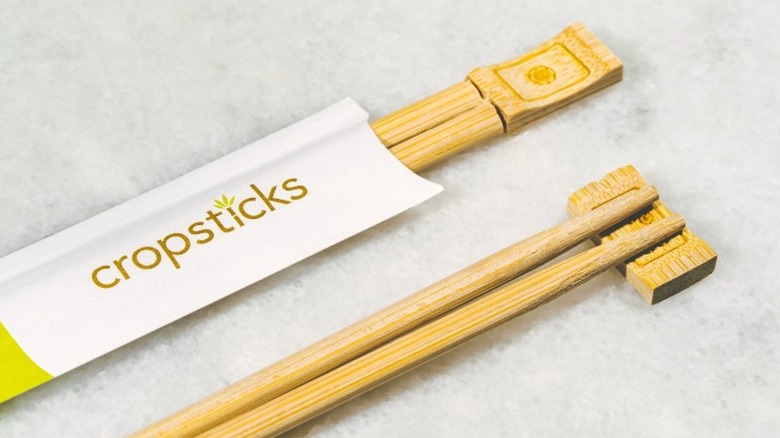What Happened To Cropsticks After Shark Tank?
In 2015, Mylen Yamamoto was on a long flight and found herself growing frustrated that her chopsticks kept rolling off her seat tray. Her irritation sparked the idea for Cropsticks: disposable chopsticks with a snap-off end that can serve as a resting place. At the time, Yamamoto was the assistant director of Loyola Marymount University's Fred Kiesner Institute for Entrepreneurship, so she enlisted the help of the professors, staff, and students to help her develop her product.
The Hawaiian, fourth-generation Japanese-American quickly realized that teaching students about entrepreneurship was quite different from actually being an entrepreneur. "I had no idea how to make a product before this experience," Yamamoto told LMU. "But the resources today make it possible for someone like me. I was really fortunate to be working at LMU, which has everything you could ever need to start a business." She was nervous about putting her years of teaching into practice but excited to show her students what was possible.
When Yamamoto appeared on Season 8, Episode 20 of "Shark Tank" in 2017, she was optimistic about her bamboo Cropsticks, despite not having a distributor. She was left stunned, however, when Shark Kevin O'Leary told her, "You remind me of Bambi in the bamboo forest, and you're about to get squashed."
The Sharks thought Cropsticks' founder overestimated her product
When Mylen Yamamoto appeared on "Shark Tank," she asked for $75,000 in exchange for a 12.5% stake in Cropsticks. The Sharks were intrigued by her product, as she explained that chopsticks were invented over 4,000 years ago and that millions of trees are killed each year to make the disposable wooden utensils. Not only was Yamamoto redesigning chopsticks, but the bamboo used to make her product was eco-friendly. Lori Greiner called the design clever and immediately asked about Cropsticks' sales.
Yamamoto explained that she sold almost 22,000 Cropsticks during a Kickstarter campaign and that she had 190,000 conditional purchase orders with a profit of $125,000. While most of the Sharks were impressed by this, Kevin O'Leary was not. He bowed out after telling Yamamoto he thought she was going in the wrong direction. Next to leave was Mark Cuban, who thought the entrepreneur was being unrealistic about Cropsticks' future. John Daymond appreciated her strategy, but he was out, too. Robert Herjavec told her he admired her but explained that he saw Cropsticks as little more than a commodity. The last to bow out was Greiner, who thought Cropsticks were great but weren't for her. Yamamoto thanked the Sharks for their time and left the show without a deal.
Cropsticks officially launched when the episode aired
Despite not getting a "Shark Tank" deal, Mylen Yamamoto's journey was far from over. In 2020, she told the podcast AsianBossGirl that the episode was released at the same time she officially launched Cropsticks, which gave the company a huge boost. "It was like free marketing. It was like a Super Bowl commercial," she said. While she admitted that not getting a deal was devastating, the free publicity made up for the disappointment. "Today, we're in over 250 different restaurants, we're in Disneyland, we're on Hawaiian Airlines, we're in the Four Seasons." She also explained on the podcast that an upcoming deal would put Cropsticks in retail stores, later revealed to be the chain Cost Plus World Market.
In 2019, Cropsticks announced via Instagram that it had become a Certified B Corporation, describing the achievement as "the highest standard of social and environmental responsibility." To qualify for this certification, a business must meet or exceed a B Impact Score of 80. According to the company behind the certification, B Lab, Cropsticks' impact score is 117.9.
Cropsticks eventually developed a bamboo fiber straw
After launching its second item in 2019 — disposable straws made from bamboo fiber — Mylen Yamamoto's company began referring to itself as Cropsticks by Cropmade to signify that it would be expanding its product line. One of these products was the Cropmade Full Circle Sustainable Planter Bundle made with upcycled Cropsticks, which first appeared on the company's Instagram as an office decoration before being sold on its website.
The brand's next update came in the form of Cropstick customizations. The Cropsticks offered at Disney's Aulani Resort already featured laser-printed designs like Mickey Mouse, but with this update, customers could ask for their own orders to be personalized. Additionally, Cropsticks' social media pages frequently announced new sales, whether for occasions like Black Friday or by offering giveaways.
While Cropsticks' website is geared toward businesses and large gatherings, it does offer a few smaller items. For a newbie who's curious about the company, the $9 Sample Pack contains two regular straws (6 millimeters), two cocktail straws (6 millimeters), a large straw (12 millimeters), and a half-wrapped package of Cropsticks. The next-smallest item is the Cropsticks Retail Pack, which sells for $8.99 and holds 25 unwrapped Cropsticks.
Cropsticks has no plans for new products
In May 2022, Mylen Yamamoto posted on Cropsticks' Instagram about a new company she co-founded with business partner Michelle Hanabusa called Specialguest. The venture's purpose was to help other small businesses achieve the same level of success Yamamoto had accomplished with Cropsticks. Whether or not Specialguest is still active is unclear, but Yamamoto's LinkedIn page shows that, outside of Cropsticks, she's also the CEO of talent management and production company Clique-Now.
Cropsticks doesn't seem to have anything new in the works, but its Facebook and Instagram pages are updated consistently. Besides standard posts about its products, the company also shares customer reviews, photos of Cropsticks in action, and the occasional personal entry, such as Yamamoto's husband and child. The entrepreneur doesn't seem to be slowing down — besides her roles at Cropsticks and Clique-Now, she's also listed by UCLA Extension as a Leadership Communication Strategies teacher, as well as being a TikTok Creative Learning Partner.
